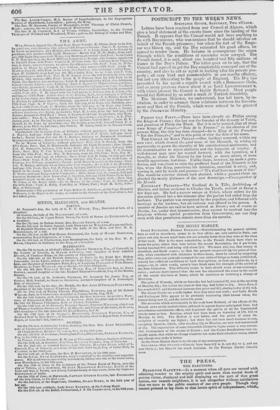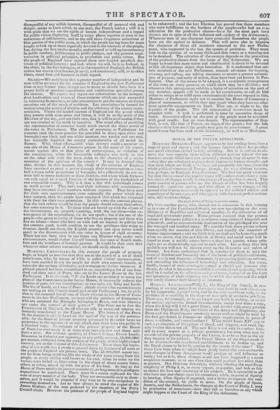THE PRESS.
THE ELECTIONS.
BRIGHTON GAZETTE—At a moment when all eyes are turned with admiring wonder to the mighty spirit and more than mortal deeds of patriot virtue, displayed and still displaying on the part of that great nation, our nearest neighbour, it is not altogether without satisfaction that we turn to the public conduct of our own people. Though they cannot pretend to lay claim to that heroic spirit of independence, which,.: disregardful of any selfish interest, aisregardful of all personal risk and danger, seems to have seized, as one man, the French nation ; still it is with pride that Ave see the spirit of honest independence and a regard for public virtue displaying itself in many places superior at once to the seductions of self-interest, and to the still more dangerous seductions of that portion of the public press, to which the people having been for years taught to look up as more especially devoted to the interests of the people, has, during the last twelve months, endeavoured to hold up inconsistency in public conduct, faithlessness in public pledges, and the grossest tergi- versation in political principles, as patriotism and public virtue. But the people of England have rejected these new fangled mawkish doc- trines of political honesty ; and look where we will, be it in Ireland, in the cities, in the free boroughs, or in the counties of England, the British nation has shown that honour, hcnesty, and consistency, still, as in olden times, stand first and foremost in their regard.
GLOBE—We anticipate that a greater number of independent and fit men will be returned for the counties of England to the new Parliament than at any former time, though not so many as should have been if a proper habit of previous consultation and combination prevailed among the electors. We cannct but repeat our exhortations to the indepen- dent landholders and vcters of those counties \which are now successful in returning fit members to take precautions to put the returns on future ,occasions out of the real of accidents. Let associations be formed for mainteining the purity of election and the efficiency of the county repre- sentation. Unless the landed interest of England use the power which they possess with some sense and virtue, it will be to the merit of the Minister of the day, and not their own, that it will be attributable if they are not crushed tc the earth by taxation. The moral effect of purifying he representation of counties would much exceed the direct power of the votes in Parliament. The effect of returning to Parliament for counties (and the same practice has prevailed in many open cities and boroughs) one black and one white member, one patriot and one tool, has naturally deprived the county representation of all moral in- fluence. With what effect—with what decency could a member on one side of the House of Commons protest in the name of his consti- tuents against this or that piece of extravagance, or violation of the constitution, when his honourable colleague was ready to rise on the other side with the same claim to the character of a repre- sentative of the opinions of the county ? It may be doubted whe- ther, divided in this manner, the whole of the counties of England have exercised so great a power through their representatives as some half a dozen noble proprietors of boroughs, who collectively do not re- turn half so many members as these districts, and whose whole fortunes are only equal to a small fraction of the incomes of the freeholders of one respectable county. Why is it that a few rich individuals possess so much power ? They have used their influence with consistency— they have returned their members without expense. They have used for their own aggrandisement more rationally the power which they have usurped, than the people have employed that which has remained with them for their own protection. In this sense the common phrase, that the best reform would be that the people should reform themselves, has some meaning in it. To these who are bound up with the abuses of the Government, or, properly speaking, with the one abuse—the ex- travagance of the expenditure, we do not speak ; but if the rest of the peoele—the great majority of those who live on property and those who live on labour—those who have no wish and no interest in .polities but the common good, would combine to use the privileges they enjoy as freemen should use them, the Eaglish counties and open towns would speak to the Government with one voice in favour of rigid economy. There has not been seen in our times any Minister who, under such circumstances, would shelter himself beneath the votes of Scotch mem- bers and the nominees of borough patrons. It would be then seen that whatever other reform was needed, we should easily obtain it.
Mortxtem CHRONICLE—In this country the people of property begin at length to perceive that they are at the mercy of a set of titled mendicants, who, by means of what is called -virtual representation, have been enabled to tax the people for their own separate benefit, to squander the savings of industry, and mortgage our future resources. A printed placard has been transmitted to us, containing a list of one hun- dred and sixty sons of Peers, who sat in the Lower House in the lost Parliament. It is 01)S InTed, " if the Lords are permitted to usurp the place of the Commoners in the Lower House, it necessarily reduces the number of parts (of our Constitution) to two only, v:z. King and Lords. The list of Lords, and sons of Peers, plainly shows that encroachments are making on this Constitutional part of our Parliament $ • for, in addi- tion to the annexed list of sons of Peers who sat in the House of Com- mons in the late Parliament, we must add the numbers of Commoners who are returned for Boroughs belonging to Peers, and who likewise are under the control of their patrons!' The Peers are in fact the Constitution of England, for all who are able to command returns are instantly transferred to the Upper House. The interest of the Peers in the country is chiefly based on the spoil of the rest of the commu- nity, for the share of private property poesessed by the order bears no proportion to the amount of money which they draw from the public in a hundred ways. No estimate of the private property of the House of Peers has ever made it at more than between two and three mil- lions a year. But without speaking of Chmelt Ileines, Crown Lands, Sinecures in Colonies not appearing in any public account, 55,000,080/. per annum, extracted from the pockets of the people of this highly-taxed country, are at the disposal of this Aristocracy. Never since the begin- ning of the world was a people so ground dowii by burdens of all sorts as the people of England are ground down. The 55,000,000/. alear too, are far from being anything like the whole of the taxes wrung from the people, as every citizen well knows to his cost, when he sums up the various rates levied oe him—some in the shape of direct money taxes, Others as tithes, mined up with the price of his food. So long as the Rouse of Peers retains its present ascendency, so long must this profligate expenditure be continued. There must be a raison suffisonte for the vote of every member of the body. They are accountable only to them- selves, and it would be singular if they were to be over-scrupulous in rewarding themselves. Let us bear always in mind the expose of Sir Tames Graham, of the sum pocketed by the members of the Privy Cotweil Alone, However the patience of the people of England begins to be exhausted ; and the late Election has proved that those members who were indifferent to the burdens of the people—who had no cone sideration for the productive classes—have for the most part been thrown out in spite of all the influence and cajolery of the Aristocracy. Wherever men of any character have presented ihemselves the people have set the squires at defiance. This will serve also to improve the character of those old members returned to the new Parliae meat, who supported in the last the system of profusion. They must look on the ejection of so many thick-and-thin voters as a warning not to be despised. The salvation of the country depends on the protection of the productive classes from the fangs of the: Aristocracy. We are happy to learn that more union and combination is about to be devoted to this all-important object than heretofore. It is understood that cer- tain members of the new Parliament, staunch advocates for inquiry, economy, and reform, are taking measures to ensure a greater earnest- ness of purpose, and unity of action, than have been yet known in Par. liament. One of the means to be adopted, is a systematic arrangement of the votes on every question on which there may be a division ; and whenever this arrangement exhibits a laxity of attention on the part of any member, appeals will be made to his constituents, to call on him either to resign or to fulfil more conscientiously the trust reposed in him. Members of Parliament ought not to consider the House of Commons a place of amusement, to which they may repair when they have no other more agreeable engagements on hand. They are, or ought to be, the deputies of the people. The old aristocratical insouciance must be grappled with. A rock is perforated in time by successive drops of water. Successive efforts on the part of the people must be rewarded with good results. Let no man despair. The representation of Eng- land, is not, like that of France, an organ of the people ; but the late elections show how nmels the people may gaits by perseverance. A great moral lesson has been read to the Aristocracy, as well as to Ministers.



























 Previous page
Previous page